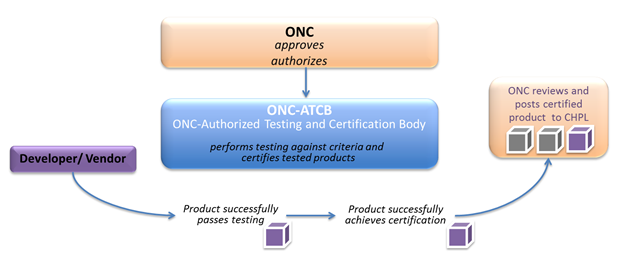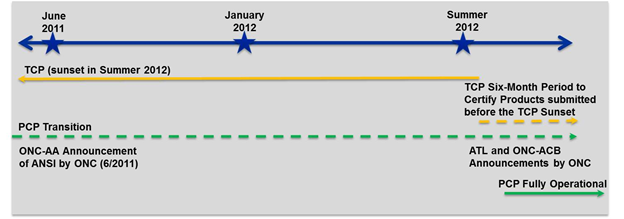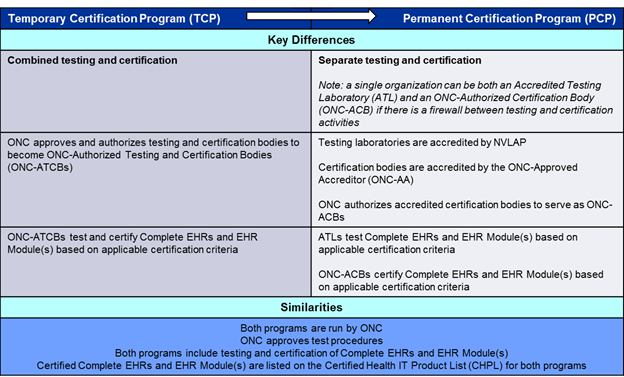Temporary Certification Program
Overview
The Office of the National Coordinator for Health Information Technology (ONC) established a Temporary Certification Program (TCP) for Health Information Technology (Health IT) to provide a way for organizations to become authorized by the National Coordinator to test and certify Electronic Health Record (EHR) technology.
ONC-Authorized Testing and Certification Bodies (ONC-ATCBs) test and certify EHR technology in the TCP. The Certified Health IT Product List (CHPL) provides the authoritative, comprehensive listing of certified Complete EHRs and EHR Modules. The CHPL is updated as new products are certified by ONC-ATCBs.
Certification assures health care providers that the EHR technology they adopt satisfies the capabilities needed to participate in the Centers for Medicare and Medicaid Services (CMS) EHR Incentive Programs.
Use of Certified EHR Technology (CEHRT) is a core requirement for health care providers to become “meaningful users” and eligible for payment under the CMS EHR Incentive Programs.
The graphic below provides an overview of how the TCP works:
Temporary Certification Program Overview – Organizations
Temporary Certification Overview: Processes
Program Sunset
The TCP began in July 2010, and will sunset in summer 2012 once the Permanent Certification Program (PCP) is fully constituted. Once the PCP is operational, testing and certification activities will be performed by separate entities. Testing will be performed by Accredited Testing Laboratories (ATLs) and certification will be conducted by ONC-Authorized Certification Bodies (ONC-ACBs).
The Temporary Certification Program; Notice of Extension states that the TCP sunset should be tied to the effective date of the Final Rule for Medicare and Medicaid Programs; Electronic Health Record Incentive Program—Stage 2 and Health Information Technology: Standards, Implementation Specifications, and Certification Criteria for Electronic Health Record Technology, 2014 Edition; Revisions to the Permanent Certification Program for Health Information Technology. The release is planned for summer 2012.
Timeline of the Transition from the Temporary Certification Program to the Permanent Certification Program
Transition to the Permanent Certification Program
Upon sunset of the TCP, ONC-ATCBs are prohibited from accepting new requests to test and certify Complete EHRs or EHR Modules, but are permitted up to six months after the sunset date to complete all testing and certification activities associated with pending or current requests received prior to the sunset date.
In the Permanent Program, Developers and Vendors will work with ATLs to test their products and ONC-ACBs to certify their products.
The CHPL will continue to be the one-stop shop for cross-validating Certified EHR Technology, and the CHPL will continue to be managed by ONC.
EHR product certifications made in the TCP are valid in the PCP.








